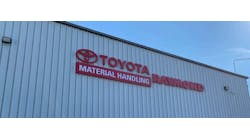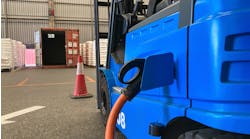While pessimism dominates business conversations these days, a little creative thinking about supplier relationships can uncover new growth opportunities.
Consider lift truck dealers. The value of a strong relationship between dealer and end user is often tragically understated. It’s tragic for lift truck buyers because cutting-edge dealers offer much more than just equipment. Many of them are partners for productivity—and profitability.
Each year, lift truck manufacturers acknowledge their best dealers. There’s the President’s Award from Toyota Material Handling, the Summit Awards from Crown Equipment, the Dealers of Excellence selected by Clark Material Handling, Cat Lift Trucks’ Dealers of the Year and Raymond’s Dealers of Distinction. Jungheinrich Lift Truck awards one lucky dealer each year with the Golden Gabelstapler (“lift truck” in German). What sets these dealers apart from the rest? According to lift truck manufacturers, it’s not just their sales figures. Revenue is only one measurement of a distributor’s value.
As Chuck Leone, vice president of sales and marketing at Jungheinrich Lift Truck Corp., puts it, “The end customer relies on the dealer to be the person who keeps the lift trucks running in the operation to ensure deadlines are met. If this is not the case, they are unlikely to repurchase from this dealer when new lift trucks are required.”
That’s why Jungeinrich, and other lift truck companies, consider both sales and service when selecting top dealers. “Many customers will have a very strong relationship with their local lift truck dealer and the service they provide, with a lesser importance on the lift truck itself,” says Leone.
More Than Product
Award-winning dealers don’t just sell industrial vehicles to customers and then move on. They serve as long-term business partners, helping equipment buyers get the biggest return on their investment.
And, this extra service can be particularly valuable in difficult times. “In today’s economy, customers are looking to develop partnerships with their lift truck dealers to reduce overall costs, centralize billing and receivable programs, as well as understand up-to-the-minute service and utilization information,” explains Jim Moran, senior vice president of Crown Equipment Corp.
In fact, it could be argued that selecting a lift truck dealer is a strategic material handling decision.
“Lift truck dealers are the liaison between the manufacturer and customer,” says Kent Eudy, vice president of dealer sales at Cat Lift Trucks, one of Mitsubishi Caterpillar Forklift America’s product lines. “End users view them as the local expert in all things related to material handling and facilities management.”“There is so much more to a lift truck purchase than the product itself,” adds Melinda Beckett-Maines, national marketing manager for Toyota Material Handling USA Inc. (TMHU).
In fact, companies that sell Raymond Corp.’s material handling equipment are not called “dealers” or “distributors.” They’re known as “sales and service centers,” and for good reason.
“Raymond sales and service centers employ a full range of professional services, such as sales, training, maintenance, site application analysis, aftermarket sales, parts management, financing programs and fleet optimization,” explains Joseph Ginnetti, vice president of sales at Raymond.
For example, sales and service employees help facility managers sift through large amounts of data generated by Raymond’s iWarehouse fleet optimization system. They then use that data to recommend ways to reduce maintenance, downtime and overall operating costs.
Crown’s top dealers offer a similar data analysis service. They use tracking systems, such as Crown’s InfoLink, to help customers uncover cost-of-ownership information and enhance fleet productivity.
“Top dealers understand which trucks work best, given a customer’s specific application and needs,” Eudy says. Cat Lift Trucks monitors dealer performance through its ongoing customer satisfaction index program. “The results are then played back to our dealer partners to help them focus their improvement efforts in areas important to our mutual customers,” says Eudy.
Education is Power Leading dealerships know they can’t move beyond the lift truck sale without employing skilled technicians and arming them with the latest information.
At eight training centers throughout the U.S., Crown offers in-depth educational programs to dealer employees. “Service technicians at Crown dealerships benefit from unique programs, such as Demonstrated Performance Service Training, which goes beyond traditional classroom training to allow participants to work on trucks with instructor supervision,” says Jim Moran, senior vice president of Crown. “The most successful dealerships maintain a skilled, knowledgeable team that knows the products and what it takes to do the job.”
TMHU’s Beckett-Maines agrees. “Dealers with properly trained sales and support personnel will help
customers on many levels,” she says. “Salespeople have knowledge of the various industries and will analyze specific needs and make recommendations tailored to each customer. Service technicians should have ongoing, up-to-date training specific to the type and model of truck customers are buying to help pinpoint diagnoses and keep productivity and uptime at peak levels.”
In December 2006, Clark Material Handling assembled dealer representatives from across North America to create a dealer advisory group, which gives Clark executives valuable insights into dealer performance and customer satisfaction. Since its inaugural meeting, the dealer advisory group has helped Clark with its sales and marketing, aftermarket parts and product development efforts.
A Moment’s Notice Lift truck dealers can also help meet changing material handling equipment needs at a moment’s notice.
“It’s important to ensure your dealer has enough service technicians, parts inventory and service vans available to service your lift trucks as quickly as possible,” says Beckett-Maines. “Part of the purchase consideration should be the location of the dealer and how quickly they can respond to service calls.” She adds that dealers help customers increase uptime and drive down unnecessary costs by managing work orders, tracking repairs and sending alerts when trucks are due for maintenance.
Leone explains that material handling managers don’t want to be in the lift truck business. “This is the job of the dealer,” he says. Although maintenance agreements vary by customer, many dealerships offer full maintenance services or regular preventive maintenance. It all depends on customer needs.
Crown’s dealers provide after-hours, emergency service as well as customized equipment programs. “Flexible leasing programs, short- and long-term rental programs or factory-supplied rebuilt trucks and components enable facility managers to handle peak-season activity or the short-term logistics contracts that are becoming popular,” Moran explains.
He also points to the importance of parts availability. “Top-performing Crown dealerships leverage a comprehensive, computer-controlled inventory system to maintain an industry-leading fill rate,” he says, “meaning the right part is on the shelf when customers need it.”
Crown dealerships also make consignment programs available. Parts are available immediately because they’re stored at a customer’s facility, Moran says.
Cat lift truck dealers specialize in operator training programs, on-site maintenance services as well as regular equipment inspections, fleet management services and electronic parts ordering, which allows customers to order replacement parts for any make or model of lift truck through their own computer terminals.
“Many dealers offer fleet management, consignment programs for parts, battery-charging systems, rapid-charging systems and facility maintenance programs,” adds Scott Johnson, director of dealer services at Clark. “Lift truck sales are clearly an important part of the dealer/customer relationship, but we believe that a solid dealer has so much more to offer a smart, calculating end user.”
On the Fringe
Selecting dealers that are more like consultants and fullline equipment suppliers is a shrewd business decision.
Crown dealers, for example, offer tips and guidance on strategic material handling issues, such as facility design, according to Moran. He says they use computer-aided design technologies to help customers visualize a redesigned facility.
TMHU dealers offer PosiCharge fast chargers, automated guided vehicles, aerial work platforms, tow tractors, and more, according to Beckett-Maines.
“Most of our dealers offer everything from sweepers to scissor lifts to burden carriers,” adds Johnson at Clark. “Additionally, most offer rack, conveyor systems, modular offices and a wide variety of OEM and ‘will fit’ aftermarket parts.”
And, Raymond dealers offer a relatively unusual service: disaster recovery. “Recovery planning enables warehouses, distribution centers and retailers to minimize lift truck downtime after a disaster that may cause power outages that affect the ability to charge lift truck batteries,” says Ginnetti. “Raymond and its authorized sales and acservice centers work together to offer disaster planning and preparedness services to Raymond customers to get material handling operations back up and running.”
Now, that’s a lift truck partner that’s in it for the long haul.
| No Crying Over Spilled Milk Brodie Toyota-Lift is a material handling equipment dealer headquartered in Lawrence, Mass., with branches in Sharon and Shrewsbury, Mass. The company offers Toyota, Hoist, Manitou and Clark brand lift trucks; Genie, Haulotte US and Aichi brand scissor lifts/booms; and Cascade and Bolzoni-Auramo brand attachments. Ronald McCluskey, president, says most of his business comes from short-term lift truck rentals. “Allied products—pallet rack, shelving, conveyors, etc.—also account for a large part of our business,” he says. McCluskey adds that economic conditions are creating more interest in fleet survey analyses, which help customers determine optimum fleet size, reduce maintenance costs and lower operating costs. One day, Rick Agostinelli, territory manager for Brodie Toyota-Lift, was discussing some repair issues with the distribution manager at a Dunkin’ Donuts warehouse in Bellingham, Mass., when an employee accidentally spilled a pallet of milk. “It made quite a mess, and more importantly, put the manager in a jam,” says McCluskey. The manager had planned a big open house the following day, and he didn’t have time to devise a plan to clean the floor. Rick had an idea. He drove back to the dealership and picked up a walk-behind scrubber. “After getting approval from his boss, Rick returned and not only cleaned up the accident area but spent an additional hour making sure other areas shined, as well,” says McCluskey. “The open house turned out great the next day, and the fact that our service rep went above and beyond the call of duty has resulted in a loyal and rewarding relationship with this customer.” |
| Customer First Based in Charlotte, N.C., Southeast Industrial Equipment Inc. (SIE) has nine locations throughout the southeastern U.S., serving 3PLs, distributors and manufacturers from Fredericksburg, Va., in the North to Savannah, Ga., in the South. SIE employees do more than recommend equipment purchases. “Two months ago, we had a customer who came to us needing equipment to crush cases,” recalls Cory Thorne, president of SIE. “The obvious option was for the customer to purchase a truck and special attachment that could crush the cases. However, our local service technician saw the opportunity to rebuild an existing clamp for this low-use application, thereby saving the customer approximately $200 a month. This type of success has furthered our partnership with the customer and is helping to extend our contract for an additional year.” |


